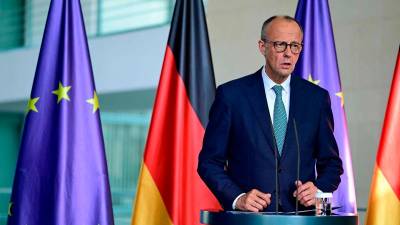BERLIN: German Chancellor Friedrich Merz has driven sweeping changes in security, economic, and migration policy during his first 100 days in office.
His ambitious agenda has faced widening cracks in his uneasy coalition with the Social Democratic Party (SPD).
On election night in February, Merz promised a “rambo zambo” approach, signalling both energy and unpredictability.
At 69, he swiftly pursued reforms, particularly in response to geopolitical shifts under US President Donald Trump.
“Germany is back,“ Merz declared, pledging to revive the economy and military after what he called lacklustre leadership under Olaf Scholz.
Even before taking office, his CDU/CSU alliance with the SPD loosened debt rules to fund defence and infrastructure.
Merz vowed to build “Europe’s largest conventional army” amid tensions with Russia and maintained strong support for Ukraine.
His NATO spending pledge won favour with Trump, who hosted him warmly in June after a tense US-Ukraine meeting.
Merz praised Israel for handling “dirty work” against Iran but later froze arms exports over Gaza, showing his unpredictable stance.
Domestically, he cracked down on irregular migration, a sharp shift from Angela Merkel’s centrist policies.
He aims to counter the far-right AfD, which gained 20% in February by capitalising on immigration fears.
His global focus earned him the nickname “foreign chancellor,“ but SPD allies feel sidelined by his right-wing policies.
The SPD, which scored just 16% in the election, struggles to reconcile with Merz’s conservative agenda.
Public approval for Merz has dropped to 32%, down 10 points, reflecting voter scepticism.
His inauguration faced rebellion when MPs opposed him in the first round of voting, exposing coalition tensions.
Critics oppose his hardline immigration stance, welfare cuts, and lukewarm climate policies.
Merz sparked outrage by dismissing LGBTQ flag plans, calling the Reichstag “not a circus tent.”
A major crisis erupted over judicial nominations after right-wing media targeted SPD nominee Frauke Brosius-Gersdorf.
The CDU/CSU withdrew support, delaying the vote until Brosius-Gersdorf withdrew her candidacy.
The Bavarian CSU further strained ties by demanding benefit cuts for Ukrainian refugees, opposed by the SPD.
SPD Vice Chancellor Lars Klingbeil warned against provocations, citing “far too many arguments” in government.
Both parties fear public infighting could boost the AfD, their common political rival.
With summer recess underway, unresolved disputes loom for Merz’s return.
Political analyst Wolfgang Schroeder noted Merz prefers big-picture thinking but warned that “small print” issues fuel crises.
From judicial disputes to refugee policies, coalition tensions persist over details Merz often overlooks. – AFP
